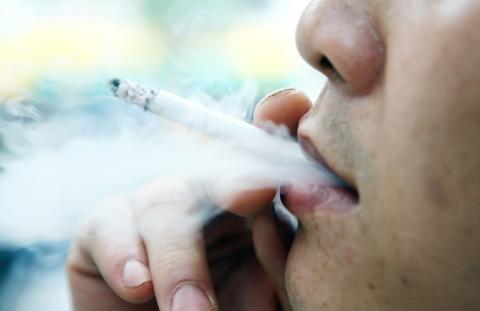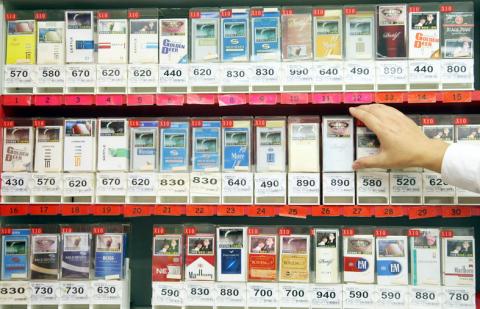The Cabinet yesterday passed a draft amendment to raise the tax on cigarettes, as well as the health and welfare surcharge on tobacco, by NT$25 per packet in a bid to help 740,000 people quit smoking, or a decline of 20.8 percent, officials said yesterday.
Under the amendments to the Tobacco Hazards Prevention Act (菸害防制法) and the Tobacco and Liquor Tax Act (菸酒稅法) approved at a Cabinet meeting, the health and welfare surcharge per pack of cigarettes would be raised to NT$40 from NT$20, while the tax on cigarettes would be increased to NT$16.8 from NT$11.8.
Even if the legislature approves the amendment, Taiwan would still not meet the standard set by the World Bank in which the tax, and health and wealth surcharge on cigarettes, should account for between 67 percent and 80 percent of the price, Department of Health Vice Minister Day Guey-ing (戴桂英) said.

Photo: CNA
Day said that an increase of NT$29 in the tax and surcharge is needed to meet the standard because the duties component currently accounts for only 54 percent of the price.
Cigarette prices are relatively low in Taiwan in comparison with the average price of NT$77 a packet in Thailand and NT$99 in Malaysia, but similar to the price of NT$68 in China, Day said.
Vice Minister of Finance William Tseng (曾銘宗) said the adjustments to the duties would result in a loss of NT$610 million (US$20.73 million) in tax revenue, but would bring in an additional NT$25 billion in health and welfare surcharges.

Photo: CNA
The revenues would be used to fund various welfare projects — to subsidize people who cannot afford to pay their health insurance premiums, on cancer screening, to set up care centers in remote areas and to fund vaccines for children, Day said.
Bureau of Health Promotion Director-General Chiou Shu-ti (邱淑媞) said the amendment would result in a long-term benefit of NT$296 billion, the savings in healthcare costs for people who quit smoking as a result of the increased duties and the productivity they contribute to the economy in the extended years they live after quitting smoking.

Taiwan is stepping up plans to create self-sufficient supply chains for combat drones and increase foreign orders from the US to counter China’s numerical superiority, a defense official said on Saturday. Commenting on condition of anonymity, the official said the nation’s armed forces are in agreement with US Admiral Samuel Paparo’s assessment that Taiwan’s military must be prepared to turn the nation’s waters into a “hellscape” for the Chinese People’s Liberation Army (PLA). Paparo, the commander of the US Indo-Pacific Command, reiterated the concept during a Congressional hearing in Washington on Wednesday. He first coined the term in a security conference last

Prosecutors today declined to say who was questioned regarding alleged forgery on petitions to recall Democratic Progressive Party (DPP) legislators, after Chinese-language media earlier reported that members of the Chinese Nationalist Party (KMT) Youth League were brought in for questioning. The Ministry of Justice Investigation Bureau confirmed that two people had been questioned, but did not disclose any further information about the ongoing investigation. KMT Youth League members Lee Hsiao-liang (李孝亮) and Liu Szu-yin (劉思吟) — who are leading the effort to recall DPP caucus chief executive Rosalia Wu (吳思瑤) and Legislator Wu Pei-yi (吳沛憶) — both posted on Facebook saying: “I

The Ministry of Economic Affairs has fined Taobao NT$1.2 million (US$36,912) for advertisements that exceed its approved business scope, requiring the Chinese e-commerce platform to make corrections in the first half of this year or its license may be revoked. Lawmakers have called for stricter enforcement of Chinese e-commerce platforms and measures to prevent China from laundering its goods through Taiwan in response to US President Donald Trump’s heavy tariffs on China. The Legislative Yuan’s Finance Committee met today to discuss policies to prevent China from dumping goods in Taiwan, inviting government agencies to report. Democratic Progressive Party Legislator Kuo Kuo-wen (郭國文) said

The Ministry of Economic Affairs has fined Taobao NT$1.2 million (US$36,900) for advertisements that exceeded its approved business scope and ordered the Chinese e-commerce platform to make corrections in the first half of this year or its license would be revoked. Lawmakers have called for stricter supervision of Chinese e-commerce platforms and more stringent measures to prevent China from laundering its goods through Taiwan as US President Donald Trump’s administration cracks down on origin laundering. The legislature’s Finance Committee yesterday met to discuss policies to prevent China from dumping goods in Taiwan, inviting government agencies to report on the matter. Democratic Progressive Party